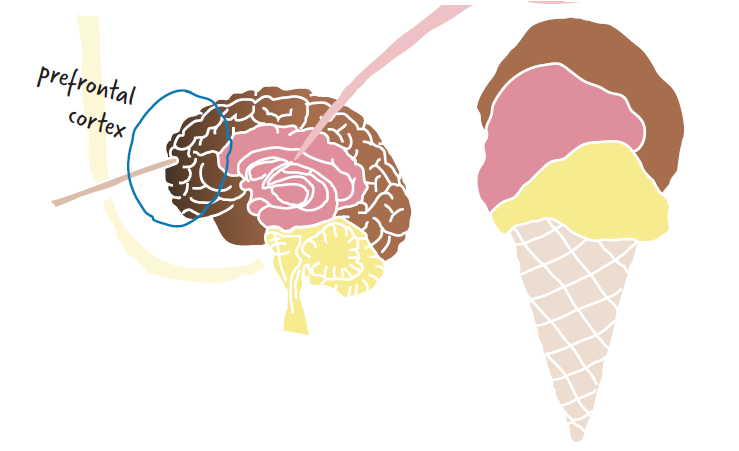It happens to all of us from time to time that we become ‘hostages’ to strong emotions like anger, and then do things that we may regret later. We yell at our loved ones or our boss, throw our brand-new smartphone on the floor, or even hit someone (even our own child or sweetheart…). Such ’emotional high jacking’ happens due to the working of our brains about which you can learn from the ME MAP Young Adults book.
You can read, for example, that our emotions often serve as a signal to help us get something that would be beneficial for us or avoid something that could harm us. You can also learn that the middle area of our brain is responsible for our emotions and that this part of the brain does not think logically or plans for the future. It lives in the present! When we get caught in a strong emotion, the logical thinking part of our brain can almost ‘shut down’!
In the ME MAP books we use Professor Linde’s ice-cream metaphor for the parts of the brain, referring to the emotional middle area as the ‘strawberry scoop’ and the conscious brain area as the chocolate scoop throughout the book. See the illustration on page 53:

The ME MAP books also give tips on how to manage emotions. For example, techniques for recognizing and regulating your feelings, and strategies to deal with the above-described emotional hijacking.
One of the exercises in the book is called REFRAME that you will find in the ‘MANAGING EMOTIONS’.section. Here is a brief summary of the steps:
- Name it! – notice it and name it.
- Frame it! – examine what you tell yourself about the situation.
- Frame it! – review and reframe your emotions and thoughts.
In this blog we offer further guidance for step 3: explaining what to do and how to do exactly.
- Take a break! The 20 MINUTE BREAK is another tool described in detail in the book, which is highly recommended when emotions and stakes are high. The stronger the emotion, the more important it is to take a break (and the longer the break needs to be). Emotions will eventually pass, but when they are intense, it takes time for them to get less intense. Most likely our logical thinking is compromised in heated moments (or even nearly stopped functioning). So, if you’re very angry, the best action is to do nothing in the moment, but to take a break. If you feel you must do something (if you’re almost suffocating with emotion) you can write a letter where you express what you’d want to say to the other person in that moment. However, don’t hand over or send the letter! Instead, tell yourself, “When I’ve calmed down tomorrow, I’ll read the letter again, and if I still think it’s the right message, I’ll pass it on.” Your instinct in the moment might tell you “I’ve thought about it, and I know it’s the right thing to do and I’m right”. But remember that feelings live in the heat of the moment and do not think about the consequences next week or a year from now, so hold back!
- Look at things from a different, or a “meta” perspective! You most probably will be unable to reach this point before taking the 20-minute break (see more about the why). When you’re calm enough, tell yourself, “I’m going to think about this problem from a broader perspective.” Ask yourself the following questions:
- What am I thinking and feeling? And what can the other person be thinking and feeling?
- If I listen now to what my feelings dictate, what should I do? And how does this course of action look like when I look at it from a meta perspective?
- What do I really want to achieve in a week/month/year? What are my aspirations and interests in the long term and for maintaining our relationship with the other party?
- Focus on your personal values! When we are caught up in emotions, the world can shrink and emotions can steer us in a certain direction. This is why it is so important to take a moment to calmly reflect on our values and what is really important to us in life (note: the exercise in the ‘MY PERSONAL VALUES’ section of the book helps you to define your values). If we know what our values, our ‘life rules’ are, in heated momenta we just need to remind ourselves of these values, by asking:
- What is really important to me?
- Does what I intend to do in the heat of the moment align with my personal values?
Good luck with managing your emotions!
You can find more about this in the ME MAP Young Adults book. Click to read about the books!




